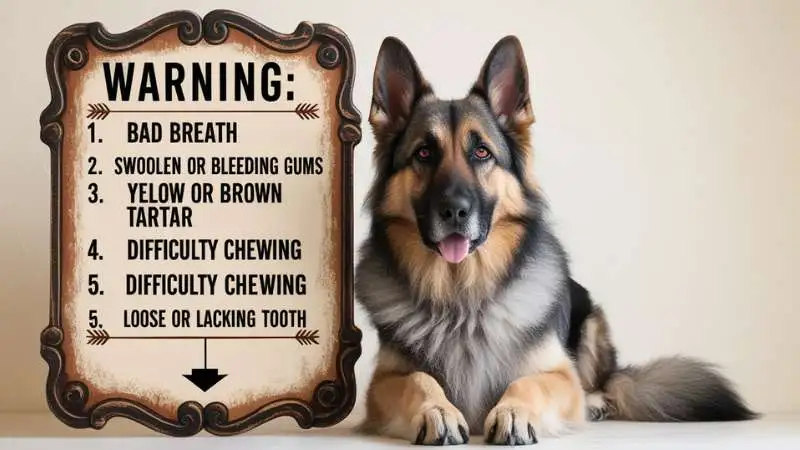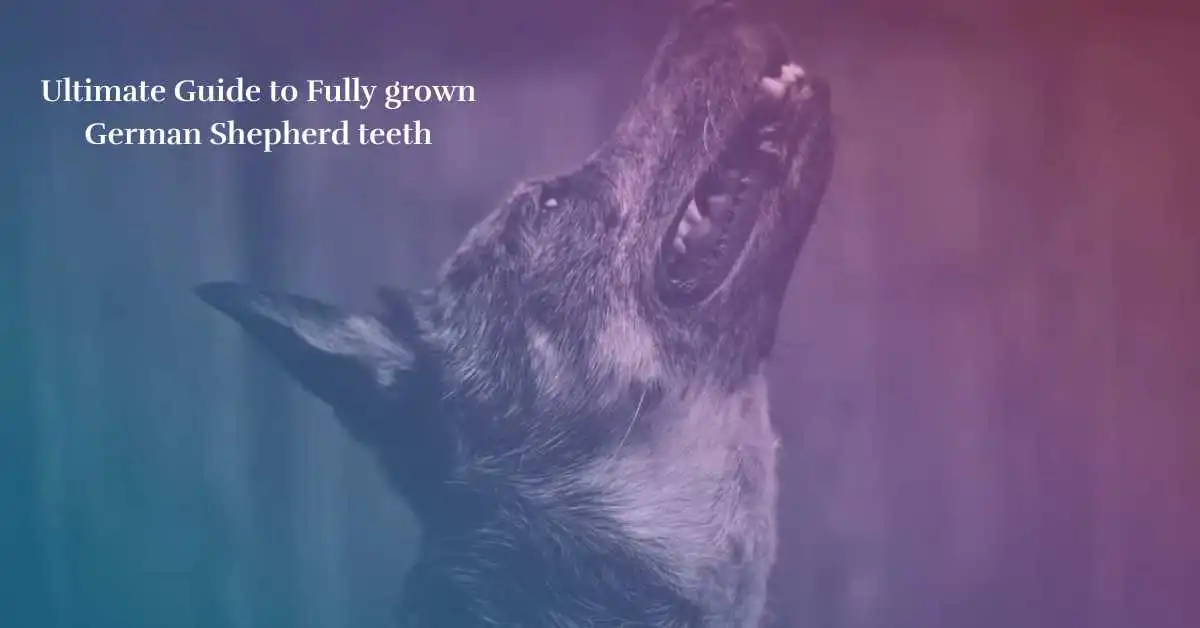German Shepherds are recognized for their sharp intellect, powerful build, and unwavering loyalty. But many dog owners overlook a critical aspect of their care: dental health. Fully grown German Shepherd teeth play a crucial role in their overall well-being.
Dental problems are common in large dogs like German Shepherds, and ignoring them can lead to severe issues such as infections, tooth loss, and painful gum diseases.
So, what do you need to know about fully-grown German Shepherd teeth? How can you prevent common dental problems and keep your dog’s teeth healthy for life?
Let’s explore the details.
Agitation:
Imagine you’re playing fetch with your German Shepherd, and suddenly they stop chasing the ball. You notice them chewing awkwardly or avoiding certain toys. These behaviours can indicate a deeper issue. Fully grown German Shepherd teeth can suffer from plaque buildup, gum inflammation, and tooth loss without proper care.
Many owners only realize the seriousness of dental problems once it’s too late. For example, untreated dental disease can lead to bacteria spreading through the bloodstream, affecting the heart, liver, or kidneys. If ignored, the costs of dental surgeries and treatments can skyrocket, causing financial strain and emotional distress for both you and your dog.
Read more: German Shepherds Love Cold Weather
Solution:
Let’s dive into a detailed guide on how to care for fully grown German Shepherd teeth, recognize potential dental problems, and ensure your dog’s long-term oral health.
Understanding Fully Grown German Shepherd Teeth
A fully grown German Shepherd typically has 42 teeth: 21 on the top and 22 on the bottom. These teeth include incisors, canines, premolars, and molars, all designed for different purposes.
Incisors: are the small teeth in the front, used for nibbling and scraping meat off bones.
Canines: These sharp, pointed teeth are used for tearing food and gripping objects.
Premolars: Positioned just behind the canines, these teeth help to chew and crush food.
Molars: The giant teeth in the back are essential for grinding food.
A German Shepherd’s teeth grow in stages. Puppies have 28 baby teeth, which they begin losing at around 12 weeks. By the time they are six months old, most German Shepherds will have their complete set of fully grown German Shepherd teeth.
Common Dental Problems in German Shepherds

As strong as they are, fully-grown German Shepherd teeth are susceptible to various dental issues. Let’s look at some common problems:
Plaque and Tartar Buildup
Plaque forms when food debris blends with saliva and microorganisms, leading to a sticky movie on the teeth. If not eliminated, it hardens into tartar, which can cause gum inflammation and enamel decay. German Shepherds, like many large breeds, are susceptible to plaque and tartar buildup, which could develop into periodontal disorder if left untreated.
Periodontal Disease
This is one of the most common diseases in dogs and can affect German Shepherds as early as three years old. It starts with gum inflammation (gingivitis) and can progress to infections that damage the tissues and bone supporting the teeth.
Tooth Fractures
German Shepherds are renowned for their strong jaws. They love to chew, but if they chew on complex objects like bones, rocks, or certain toys, this can lead to fractured teeth. Broken teeth are painful and can expose the tooth pulp, leading to infections.
Retained Baby Teeth
Some German Shepherds may experience retained deciduous teeth, where their baby teeth don’t fall out as they should. This can cause crowding and misalignment of their fully grown German Shepherd teeth, leading to long-term dental issues.
Bad Breath
Chronic bad breath is frequently an indicator of dental issues. While it’s normal for a dog’s breath to have a mild odour, a strong, unpleasant smell can indicate plaque buildup or infection in fully-grown German Shepherd teeth.
A Case Study: Max’s Journey to Better Dental Health
Let’s examine a real-life example to understand how dental issues affect a German Shepherd and what owners can do to prevent problems.
Max, a four-year-old German Shepherd, had always been active, enjoying playtime and chewing on various toys. However, his owner noticed that Max started avoiding hard chew toys and exhibited discomfort while eating.
Upon closer inspection, Max’s owner noticed his gums were swollen, and his teeth had yellowish tartar buildup. A visit to the vet confirmed that Max was suffering from periodontal disease. The vet performed a professional cleaning and recommended a daily dental care routine.
Max’s recovery involved:
- Daily brushing: Max’s owner began brushing his teeth daily using a dog-friendly toothbrush and toothpaste.
- Dental chews: These were introduced to help remove plaque and prevent tartar buildup.
- Regular vet check-ups: Max’s owner committed to regular vet visits for dental exams.
Max’s fully grown German Shepherd teeth showed significant improvement within a few months, and his discomfort was gone. This case emphasizes how regular care can prevent serious dental issues.
How to Care for Fully Grown German Shepherd Teeth
Now that you recognize the potential problems, let’s discuss the best practices for maintaining the health of absolutely grown German Shepherd enamel.
Regular Brushing
Brushing your canine dog’s teeth is the most effective way to prevent plaque buildup. Use a toothbrush designed for puppies and canine toothpaste (never use human toothpaste, as it may be dangerous). Aim to brush their enamel daily or at least a few times weekly.
Dental Chews and Toys
Providing your German Shepherd with dental chews or toys can help smooth their enamel. Look for chews designed to promote dental health, as these can help scrape away plaque while gratifying their need to chew.
Regular Vet Visits
Routine dental care in the United States is essential for recognizing capacity problems early. Your vet can perform expert cleanings that remove tartar and treat any early signs of gum disorder.
Healthy Diet
A balanced diet contributes to the overall fitness of fully-grown German Shepherd teeth. Avoid giving your canine sugary or starchy treats, which may contribute to plaque buildup. Instead, opt for extraordinary, dry kibble, which can assist in cleaning the tooth as your dog chews.
Water Additives
Water additives are another option for retaining dental fitness. Added to your dog’s drinking water, these products help lessen microorganisms and freshen your breath. While they’re not an alternative to brushing, they can be a helpful addition to your dog’s dental care routine.
Signs of Dental Problems to Watch For

As an accountable dog owner, it’s vital to understand the signs that your German Shepherd’s teeth may be in trouble. Here are some not-unusual signs:
Bad breath: persistent foul odour may be a sign of dental sickness.
Swollen or bleeding gums: We can indicate gingivitis or more intense gum sickness.
Yellow or brown tartar: visible tartar along the gum line is a warning sign.
Difficulty chewing: If your dog avoids certain foods or toys, they’ll be experiencing dental pain.
Loose or lacking tooth: This often signals superior periodontal disorder and requires immediate veterinary interest.
Conclusion:
Caring for completely grown German Shepherd enamel is critical to your canine’s overall health and well-being. If left untreated, dental issues can cause discomfort, pain, or severe fitness problems. By staying proactive and following constant dental care, you may ensure your German Shepherd’s tooth remains healthy and sturdy throughout life.
Max’s case reminds us of ways proper care can prevent extreme dental diseases. By brushing often, using dental chews, and visiting the vet, you could avoid costly remedies and ensure your dog enjoys a pain-free life.
So, don’t wait. Start worrying about your grown German Shepherd tooth today and give your canine the gift of accurate fitness.
FAQs
At what age do German Shepherds stop teething?
German Shepherds typically stop teething between six to eight months of age. During this period, their adult teeth replace the puppy teeth. Proper chew toys can help soothe their gums.
What age are dogs’ teeth fully grown?
Dogs generally have their full set of adult teeth by the age of seven months. This timeline can slightly vary based on breed and individual growth. Regular dental care is essential from this point onwards.
How can you tell how old a German Shepherd is by its teeth?
The age of a German Shepherd can be estimated by examining tooth wear and tartar. Puppies have deciduous teeth, while adults show more wear and plaque buildup. Older dogs often have significant wear and possible dental disease indicators.
How sharp are German Shepherd teeth?
German Shepherds have sharp, strong teeth ideal for their working roles. As puppies, their teeth are especially sharp but become less so as they mature. It’s important to train them early to manage biting behavior.

